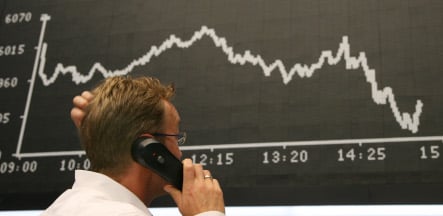Analysts largely agreed with German Finance Minister Peer Steinbrück’s assessment that – barring a total meltdown of the global financial system – Germany would likely weather the latest storm currently humbling the elite of Wall Street.
“The failure of the fourth-largest US investment bank will naturally have some impact on the German banking sector, because the financial world is all so tightly tied together these days,” Olaf Kayser from the Landesbank Baden-Württemberg told The Local. “But German banks have really wound down their exposure of the past 12 months. There’s no large danger lurking out there.”
Still, Kayer admitted the coming months could be rocky ones for Germany’s financial capital Frankfurt am Main, which is disproportionately dependant on the banking sector. “There have been worse episodes, but if there are further failures such as AIG then the risk to German banks will of course increase,” he said.
Dr Manfred Jäger, a financial markets expert at the German Economics Institute in Cologne, said the structure of the German banking sector would partially shield it from the crisis, since the country’s major banks such as Deutsche Bank and Commerzbank combine investment banking with large retail banking operations.
“It’s pretty bad at the moment. The criteria for larger loans might be a bit tougher, but there’s no evidence of a real credit crunch right now,” he told The Local. “That, of course, can change if the entire economy worsens over the next three to four months.”
Jäger said the financial crisis would “continue to hurt for the rest of the year, but I believe German banks essentially are based on a solid foundation.”
Dr Christian Dreger from the Institute for Economic Research (DIW) in Berlin said although the bankruptcy of Lehman Brothers signalled the crisis was “far from over,” the Germany economy would continue to chug along in the coming months. “Germany is fairly well placed because the United States isn’t quite as important to German exports as it used to be and consumer demand here isn’t based on credit,” Dreger told The Local. “German households don’t like to take on debt.”
Some economists in Germany, however, are predicting the fallout could be far greater than a few bankers in Frankfurt getting the sack. Dr Gustav Horn, director of the Institute for Macroeconomics and Economic Research (IMK) at the Hans Böckler Foundation, promptly slashed his growth forecast for 2009 on Tuesday.
The IMK now is only expecting the German economy to grow 0.4 percent next year, as the turbulence on the global financial markets encouraged the economists at the at the trade union friendly Hans Böckler Foundation to shave half a percentage point off their GDP forecast for next year.
The crisis was also keeping the European Central Bank, which is headquartered in Frankfurt, busy for a second day in a row, as it pumped more liquidity into the money markets in the hopes of staving off a credit crunch. After offering €30 in emergency lending on Monday, the ECB added another €70 billion on Tuesday.



 Please whitelist us to continue reading.
Please whitelist us to continue reading.